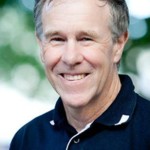Marathon Training Academy

High Fat, Low-Carbohydrate Diets | Interview with Dr. Tim Noakes [part 2]
 This is part 2 of our interview with Dr. Tim Noakes. Find him on Twitter @ProfTimNoakes
This is part 2 of our interview with Dr. Tim Noakes. Find him on Twitter @ProfTimNoakes
Many runners have experienced this frustration . . . no matter how much you run it doesn’t seem to have a dramatic effect on your weight loss.
Speaking from his personal experience of having completed over 70 marathons and ultra marathons Dr. Noakes writes,
“In forty-one years of running I have learnt that the numerous benefits of exercise do not include any sustained effects on weight loss.†-Challenging Beliefs, Kindle version
We have all heard the conventional formula for losing weight: (1) eat less (2) exercise more.
But when you step back and think about this model a cruel irony settles in . . .
The Cruel Irony
Who on the planet exercises more than long distance runners!? Some of us are running 70+ miles per week for crying out loud! (Not to mention all the cross-training workouts). Yet, the extra pounds won’t go away.
When it comes to calorie restriction, what does this do other than make you hungry all the time and steal your will to live?
The conventional formula of “eat less and exercise more” should be called “weight loss through sufferingâ€. We stubbornly tell ourselves that the suffering will be worth it because in the end we will be fitter, faster, and happy.
The Weight Loss Hamster Wheel
I don’t know anybody who exercises more than Angie. She ran over 1,800 miles last year, completed 9 marathons, and hardly ever missed a cross-training day (yoga, core training, weight training). She went through the P90X system and followed the videos to the T. She ate a calorie restricted diet and fought back her hunger pains. And how much weight did she lose in the end?
Drum roll please . . .
3 pounds
Yes, ladies and gentlemen. Three whole pounds.
She will tell you that the strength conditioning was very helpful to her running and she has no regrets about going through the program though the weight loss was minimal.
Dr. Noakes sees the irony when he writes in Challenging Beliefs,
“Conventional diets prescribed for weight control produce a long-term weight loss of about one kilogram after a year of sustained effortâ€
1 kilogram = 2.2 pounds
This is not to say that people can’t find success through conventional diets. Maybe you have lost a lot of weight through a calorie restricted diet and are healthy and happy today. But for the rest of us wondering if there is a better way to lose weight, with less suffering, I present to you the high fat low-carbohydrate diet. Actually, it’s not a diet, just a different way to eat –a lifestyle change.
Switching Sides
Interestingly, Dr. Noakes was a very strong proponent of low fat high carbohydrate diets throughout the 70s, 80s, and 90s. He is partially responsible for the “carbo loading†belief that still dominates the marathon scene today. Chapter three of his influential book The Lore of Running published in 1985 recommends increasing carbohydrate stores before exercise. He now says you should rip that section out of the book. ![]()
As it turns out, eating a high carbohydrate diet can lead to weight gain and diabetes in later life for those who are carbohydrate-resistant (CR). In our interview Dr. Noakes talks aboout his genetic predisposition to type 2 diabetes, the slow agonizing deterioration of his father’s health as he struggled with this disease, and the role of a high carbohydrate diet in compounding the problem.
Since adopting a high fat low-carb diet he has seen dramatic weight loss and reinvigorated his running –dropping his weight by 44 pounds and trimming 40 minutes off his half marathon time.
His journey to this dietary and lifestyle change is perhaps best told by the man himself.
Angie has now been following a high fat low carbohydrate diet for five months and has lost 12 pounds without feeling hungry and deprived. She hasn’t had to increase her level of exercise and enjoys experiencing steady energy levels and fewer sugar cravings.
I applaud Dr. Noakes’ willingness to follow the best evidence wherever it leads even though it means publically disinheriting his previous work. I’m looking forward to getting his newest book Real Meal Revolution.
How to Get Started with High Fat Low Carb Eating
If this sounds like a lifestyle change you can use I recommend taking the following steps.
- Listen to our interview with Dr. Noakes and watch the above video to get the knowledge behind why high fat low carbohydrate diets make sense.
- Read my blog post on Vinnie Tortorich’s NSNG diet (no sugar no grains).
- To go deeper I recommend reading at least one book. Top of the list would be Why We Get Fat by Gary Taubs.
- Go get some fat! Do you eat avocadoes, coconut oil, olive oil, real butter, heavy cream, organic meats?
- Cut out grains. It is time to stop eating bread, cereal, crackers, pasta, wheat, corn, and things made from corn.
- Cut out sugars. It is time to get rid of sugar, candy, sugary drinks and snacks, and limit your fruit intake to 1-2 servings per day. Sugar hides in most processed foods so read labels carefully.
- Stay tuned. If this all seems overwhelming to you help is on the way. Angie is creating a multi-media course on what to do to get started.
Let me know what you think! Agree? Disagree? I invite your comments below.
Happy Runninng






 Visit Podcast Website
Visit Podcast Website RSS Podcast Feed
RSS Podcast Feed Subscribe
Subscribe
 Add to MyCast
Add to MyCast